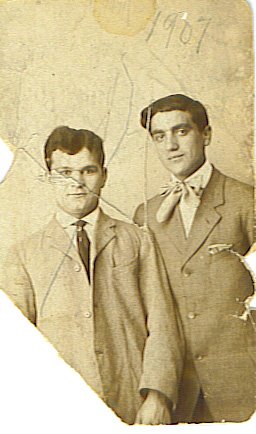Thoughts from an immigrant's granddaughter
I’m thinking about and remembering my paternal grandfather today, not only because his birthday is coming soon, but also in light of the news last night.
The gentleman on the right is my Grandfather, Emanuel Puglisi, in 1907. When my Grandpa Manuel gave me this image he wrote the date, 1907 at the top and penciled in an X over the unknown gentleman on the left so I wouldn’t mistake who I was related to. That itself makes me smile; as if I would miss the family resemblance.
In 1903, my Grandfather arrived in the United States, having traveled from Sicily. He was, as one can imagine, part of the wave of immigrants from Europe and beyond arriving in the United States and processed at Ellis Island. He had $17 when he arrived. I’ve often wondered what prompted him to leave his family and home in Linguaglossa, Sicily; as younger generations oftentimes do, I didn’t get around to asking him to tell me about that. However, a quick reading of the history of Italy and Sicily during that timeframe show a country in economic and political upheaval. Like many who come to this country, he came for better opportunities, advantages that we, his progeny, have had plenty of.
I imagine that arriving in the United States was challenging. To my knowledge, my Grandpa Manuel was not yet literate in the English language. His outward appearance would be more ruddy, and he had different customs. He needed a job of course. I do know that around the time of this photograph, my Grandfather had relocated to Rosendale, NY to work on the New York City aquaducts, and that eventually, his adeptness with things mechanical, allowed him to become a chauffeur. He later turned his talent with automobiles into his own businesses in Buffalo, New York.
Students of history during the great waves of immigration know that not everyone was accepted or welcomed. Italians and Sicilians might be referred to derogatorially as WOPS (without papers) or garlic-eaters. Even my father, a first generation citizen of the US, was told his position at a mill in Buffalo could only be considered temporary as he was Italian. French Canadian, German, Irish; many other ethnicities were on the receiving end of similar treatment.
And this brings me to the news from Martha’s Vineyard. (The link is to a gifted article in the September 15, 2022 New York Times.)
My hometown of Lowell has been accepting of refugees and immigrants since it’s beginnings. Human nature being what it is, every influx renews the struggle to overcome prejudices, and those who have lived in this city much longer than I can speak to how that has gone historically. Studying history brings the realization that there are and have always been resentments and unfair treatment of those newly arrived. That doesn’t make it right, but does recognize the existence of resistance to changes and differences brought by new ethnicities. The year-round residents of Martha’s Vineyard are trying to make right a horrible joke and a publicity stunt embraced by the governor of another state. I cannot comprehend the kind of person who uses traumatized human beings as a prop in a “joke”?
““Give me your tired, your poor,
Your huddled masses yearning to breathe free,
The wretched refuse of your teeming shore.
Send these, the homeless, tempest-tost to me,
I lift my lamp beside the golden door!””
Had my Grandfather been attempting to escape political and economic turmoil in 2022 instead of 1903, would he have been able to do so? Or are these sentiments no longer part of our country’s moral fiber?
